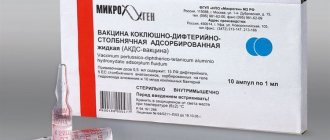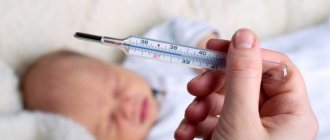The first vaccination used to prevent tuberculosis is carried out in the maternity hospital - the BCG vaccine. Due to the poor epidemiological situation and the high prevalence of tuberculosis, in the Russian Federation a decision was made to universally vaccinate infants with BCG or BCG M. All over the world there are disputes about the correctness of this, and reviews from parents are often negative. Although the use of this particular vaccination in a newborn has saved many people from tuberculosis, there are numerous complications of BCG vaccination. They are approximately 0.02-1.2 percent.
Vaccination of newborns
Even in the maternity hospital, on days 3-7, newborn children are vaccinated. It is produced in the superficial muscle of the shoulder, leaving a scar mark by which it is determined whether the child is vaccinated or not.
Healthy children are given the usual BCG vaccination; premature or unvaccinated children are given BCG M (half the dose of the pathogen compared to the usual vaccine).
During a normal reaction, the following symptoms are observed:
- slight redness at the vaccination site;
- localized abscess at the puncture site, possible increase in temperature, should go away in three days, no therapy required, if redness grows, medical consultation is necessary;
- after a month and a half, a reddish spot remains at the injection site (after a scab has formed, when it falls off), indicating that the vaccine has been given.
Causes of complications in infants
Complications in infants are possible in cases of deficiencies in the immune system due to a number of reasons:
- with an incomplete stage of phagocyte formation and low chemotaxis activity (premature);
- the infant has been diagnosed with a disease that requires treatment;
- if there is a suspicion of pathology of the nervous system;
- when finding various kinds of atypical formations;
- for somatic and gynecological diseases of the mother;
- unfavorable birth factors.
Revaccination: features and contraindications
In accordance with the vaccination calendar, revaccination of already vaccinated children is carried out at 7 years of age. This is due to the fact that the immunity formed in infancy is preserved until this moment. Pediatricians check the mark from the previous injection (small keloid scar). If there is no trace, it means that the vaccine was not given or immunity has not developed. The doctor may refer the patient:
- for tuberculin test (Mantoux test);
- for clinical blood and urine tests;
- for other additional examinations.
The Mantoux test, checking for the presence of Koch bacilli, is carried out once a year. At first the reaction to the test will be strong, but then the manifestations will become less intense.
Revaccination is mandatory for children 7 and 14 years old, but there are a number of contraindications. A child may not be revaccinated if:
- there was a history of tuberculous inflammation, or he is currently suffering from tuberculosis;
- the Mantoux test was positive or gave questionable results;
- there are any allergic reactions;
- diagnosed with leukemia or other cancer;
- chronic diseases have worsened;
- HIV and AIDS confirmed.
The doctor may consider the contraindications insignificant and prescribe a vaccination using the drug BCG-M. Its difference from the standard one is the reduced concentration of tuberculin. There are also contraindications for BCG-M and, in part, they are the same as for the main vaccine. Therefore, it is prescribed to children with great caution.
Possibility of revaccination
At seven and fourteen years of age, the vaccine is given in the following cases:
- With a negative Mantoux test;
- In the absence of contraindications identified during the first vaccination;
- Not necessary in regions with low levels of disease spread;
- Mandatory when a child comes into contact with a person sick with tuberculosis.
Contraindications
Repeated vaccination in children is not recommended:
- having malignant formations;
- taking an immunosuppressant;
- during radiation therapy;
- who are already sick with tuberculosis.
Is it possible to get vaccinated at elevated temperatures?
Vaccination is carried out only for healthy children. Therefore, the child is always examined by a pediatrician before the injection. But it is not always possible to detect an incipient viral infection during administration. Therefore, it is ideal if, on the eve of the vaccination day, you can do a general blood test of the baby.
Body temperature during BCG vaccination should correspond to the norm - 36.6. For the smallest children, 37.1 degrees is allowed.
Vaccination is not given if the child has been ill and less than two weeks have passed since recovery. You will have to postpone vaccination if there are people with an acute form of viral diseases in the same house as the baby.
Contraindications for vaccination include the following conditions:
- baby's weight is less than 2 kg (prematurity);
- diseases in the acute phase;
- intrauterine infectious process;
- diseases of a purulent-septic nature;
- moderate or severe form of hemolytic disease in a newborn;
- severe disturbances of the central nervous system in combination with severe symptoms;
- malignant neoplasms;
- taking drugs to suppress the immune system;
- radiation therapy;
- tuberculosis in family members;
- human immunodeficiency virus (HIV) in the mother.
Possible consequences
If a complication occurs after BCG, toxic symptoms occur.
They are divided into two types according to localization:
- Local - appear within a day after vaccination. A red, swollen spot appears at the injection site; if it is more than eight centimeters, and the swelling is more than five centimeters, then BCG revaccination cannot be carried out at the age of 7, which is recorded in the child’s medical record.
- General - develops after a week or two and applies to the entire body. They manifest themselves in the form of restless behavior, fever, insomnia, and anorexia. The reaction may last two days; medical supervision is required.
According to the degree of severity and depending on what temperature the child has after BCG, they are divided into:
- weak - normal condition, temperature no more than 37.5;
- moderate - moderate disorder of the body, temperature - from 37.6 degrees to 38.5;
- strong - a febrile state with severe distress, temperature above 38.5 degrees.
Due to appearance and symptoms:
- Lungs - appear when the rules of entry are violated, as well as due to poor quality of the vaccine. At the injection site, suppuration forms, which grows, an infectious, painless, fluid-secreting infiltrate is formed, requiring immediate treatment, since there is a risk that after it breaks through, the infection with blood can spread throughout the body.
- Severe - occurs if the vaccine was given to a child with contraindications to it. Such consequences of vaccination seriously affect the body.
Mild and severe complications, in turn, are divided into types, depending on the manifestation and clinical picture of the lesion:
Cold abscess
It occurs after about a month and a half if the vaccination was done incorrectly.
An inflammatory abscess forms at the puncture site, which risks developing and forming a purulent cavity. The child's condition is unstable, the temperature is high.
Recommended treatment is surgery to excise the abscess and apply sutures, followed by special postoperative rehabilitation.
Below is a photo of a cold abscess:
Lymphadenitis
Inflammation of the lymph nodes, near the vaccination site, usually under the left armpit. Occurs a month or two after vaccination. Symptoms are moderate, suppuration is rarely possible.
Surgery is indicated, followed by chemotherapy for two to three months.
Lymph node areas
Ulcers
Appears when a child has intolerance to the vaccine solution. Formations exceeding ten millimeters in diameter are possible.
Local therapy is recommended. Information about this is entered into the medical record.
Keloid scar
Occurs after an incorrect vaccination. It appears after a year, it may or may not grow. Growing ones cause pain, itching, and tension. A purple scar forms at the grafting site.
To slow down and stop its growth, radiation and physical therapy are used. Revaccination is not possible.
Ostitis
Severe complication. It appears between three months and up to five years after vaccination.
Wherein:
- the skeletal system is affected;
- the temperature is low;
- X-rays show areas of bone damage;
- characterized by the presence of osteoporosis and destruction.
Occurs if the child has serious immune problems. Treatment is surgical (method of sanitation of the lesion), with the use of chemotherapy. According to statistics: two people per two thousand.
Generalized BCG infection
A severe, rare complication when a child has disorders in the immune system. Comprehensive anti-tuberculosis and immunity-enhancing chemotherapy is prescribed. According to statistics: one person in a million.
When is BCG vaccination strictly prohibited?
Contraindications for BCG are very extensive. require separate consideration. General contraindications (permanent) are cases when vaccination is not done categorically:
- AIDS and other stages of HIV infection that suppress the body’s immunity;
- malignant blood diseases;
- presence of neoplasms;
- pregnancy;
- tuberculosis;
- acute reactions to previous vaccinations.
Dangerous consequences due to non-compliance with contraindications
Why do complications still arise after BCG, if descriptions of the possible consequences exist and are known to everyone, and mothers are instructed and carefully prepare their children for injections. Dangerous side effects may occur if:
- the quality of the drug does not meet the standards;
- there was a violation of the vaccine administration technique;
- the vaccination was given to an unhealthy child;
- The patient has a high temperature.
Exacerbations that occur due to ignoring contraindications are considered according to four indicators with symptoms:
- lymphadenitis, ulcers, abscesses;
- the infection spreads without threat to life;
- the body in a state of immunodeficiency receives disseminated (scattered) tuberculosis;
- allergy to the components of the BCG vaccine.
Is it possible to refuse vaccination?
The position of doctors is clear: children should be vaccinated, preferably all of them. That’s why we don’t offer vaccinations, but do them almost without fail. Parents who refuse are subject to powerful pressure, they have introductory conversations about the consequences and, ultimately, there is a high probability of not getting into kindergarten.
According to indications, immunization against hepatitis B and BCG is given to newborns in the first week after birth. To refuse the vaccine, the mother should act wisely and fill out an application addressed to the head of the department or the Chief Physician. The paper is drawn up in a standard way, only in the main part it should read: “...I, full name, do not give consent to the administration of the BCG vaccine to my newborn child...”, number, signature. In maternity hospitals they usually calmly look at such papers and agree, shifting responsibility to local pediatricians.
Yet a high incidence of tuberculosis now exists, creating a high risk of infection in children who lack vaccine immunity, which could lead to the return of dangerous forms of lung disease.
What to do
Some rules must be followed to minimize the risk of possible complications:
- It is necessary to conduct a sensitivity test immediately before vaccination.
- Do not wet or apply various ointments, including antiseptic ones, to the vaccination site.
- If suppuration forms, you cannot crush it; if the pus breaks out and flows out, neither wash it off nor apply iodine.
- Do not allow your child to scratch the vaccination site.
- Before and after vaccination, you should not change the child’s diet so that if an allergy appears, there is no doubt about the cause of its occurrence.
When should you see a doctor? Is it bad if the vaccine turns red or swells?
A number of complications that occur after receiving the BCG vaccine require immediate medical attention to prevent serious health consequences. These include:
- severe swelling, inflammation and suppuration, which does not go away 2-3 days after the injection;
- an extensive (more than 1 cm in diameter) ulcer that forms at the site of vaccine administration;
- high temperature observed for a long time, vomiting, diarrhea, cough (such phenomena are most often not associated with vaccination, but indicate an infectious disease);
- pain in the limb into which the drug was injected, as well as limitation of motor activity;
- the resulting ulcer does not heal for a long time.
The absence of any reactions to the vaccine also requires consultation with a doctor - this may mean that the body did not respond appropriately to the administration of the drug, or that the child has innate immunity to tuberculosis.
Sparavka. Innate immunity to tuberculosis is present in 2% of the world's population. The presence of immunity means that a person is immune to tuberculosis pathogens and is not at risk of infection. The body of such people does not respond to the introduction of an anti-tuberculosis vaccine, but this can only be determined using the Mantoux test.
In 98% of cases, BCG vaccination occurs in newborns without any complications, and with careful observation and care of the injection site, the possibility of their development tends to zero. Considering the rate of spread of tuberculosis in modern society, as well as the serious threat to health and life that it entails, the benefits of vaccination can be said to far outweigh the risk of side effects.
Where to get the BCG vaccination
Vaccination against tuberculosis is done in the maternity hospital. If it was not completed in a timely manner, then this can be done at a tuberculosis dispensary. Medical institutions also have the right to carry out this manipulation, but only if they have special permission, equipped premises and qualified personnel. It is possible to perform a strain injection by a specialist at home for a set fee.
Revaccination with BCG
Revaccination against tuberculosis is mandatory. It is carried out at the age of 7 years due to the end of the immune protection from the first vaccination. At this age, a child enters school, which means he is surrounded by new people who may be carriers of the bacteria.
At 14 years of age, BCG revaccination is carried out only based on the presence of a negative Mantoux test, which indicates a lack of immunity to tuberculosis.
In which countries are they vaccinated against tuberculosis?
Vaccination against tuberculosis is carried out for all newborns in most countries of the world with an increased epidemiological risk of contracting this disease, including India, China, Japan, Brazil, and Mexico. Russia is one of them. In some developed countries, vaccinations are performed only for children at risk.
Price, where to buy
You can buy the vaccine at most pharmacies. However, when transporting it, certain temperature conditions must be observed. You can order through specialized pharmacies with delivery to pick-up points. All conditions will definitely be met there. The price of the vaccine varies between 400 rubles per package.
What to do if BCG does not heal
Wound healing takes a long time. Each organism gives its own immune response: weak or pronounced. Therefore, parents do not need to run to the doctor in panic every time their child comes out of a wound or has a fever.
For some children, the process lasts up to a year. But, if after a year the wound has not healed, it is necessary to show the baby to the pediatrician. You should urgently consult a specialist if, six months after the injection, the damaged skin area does not scar, but remains inflamed, with a large abscess ripening in it.
Some children can scratch the wound and tear off the scab. And then the healing process begins again. To prevent this from happening, it is recommended to tie a sterile bandage around the shoulder in the area of the wound.
Modern parents often refuse to vaccinate their baby. But it should be understood that failure to prevent tuberculosis is a risk to children’s health. It’s better for a child to suffer an unpleasant injection once than to have to spend a long time being treated for a serious infectious disease.
From birth, a child is exposed to many pathogenic microorganisms, as a result of which his body is not always ready to resist them to the required extent.
In order to create immunity that can fight diseases, experts recommend using a variety of vaccinations and vaccinations. One of the most important and necessary for any child is the BCG injection.











